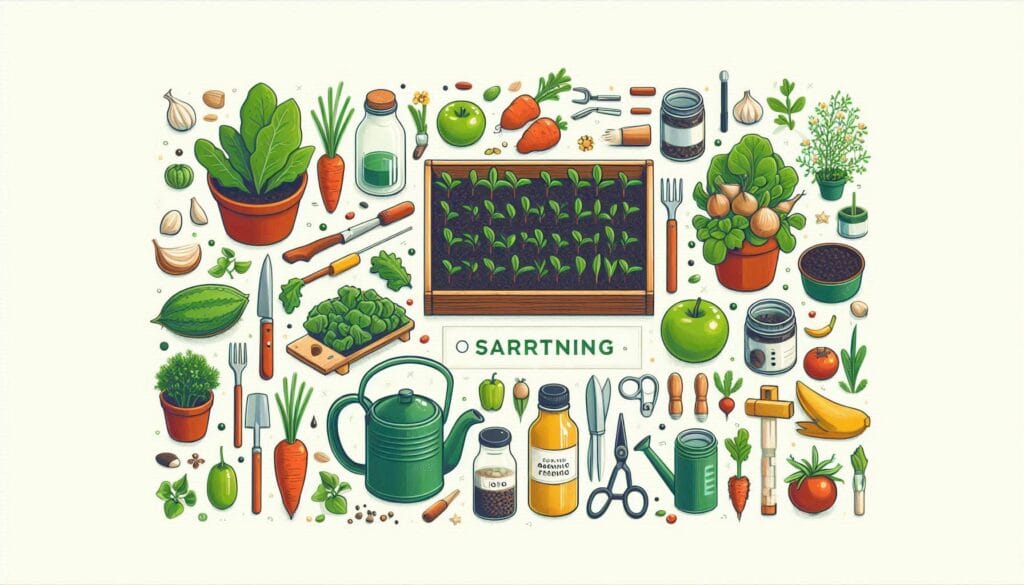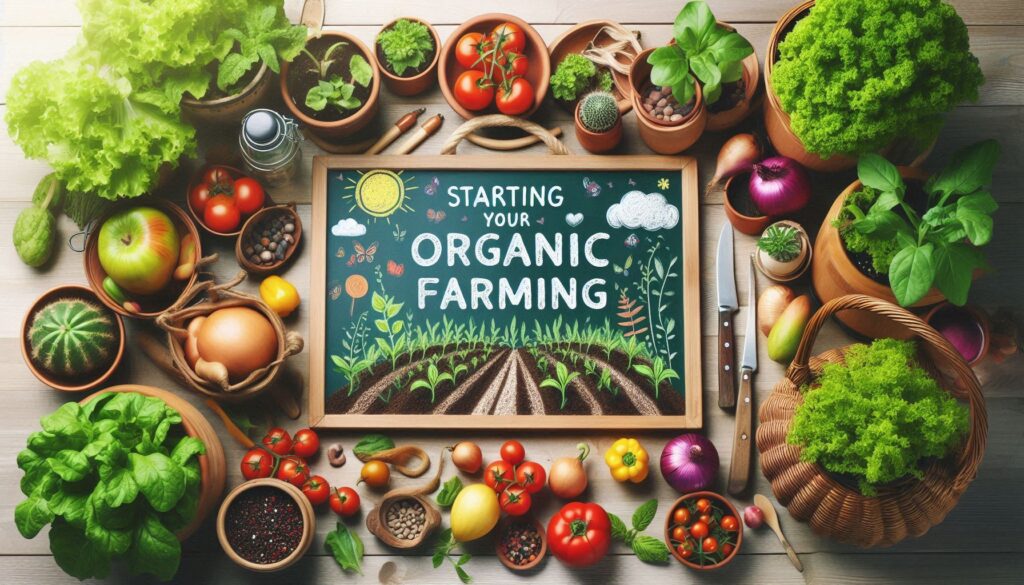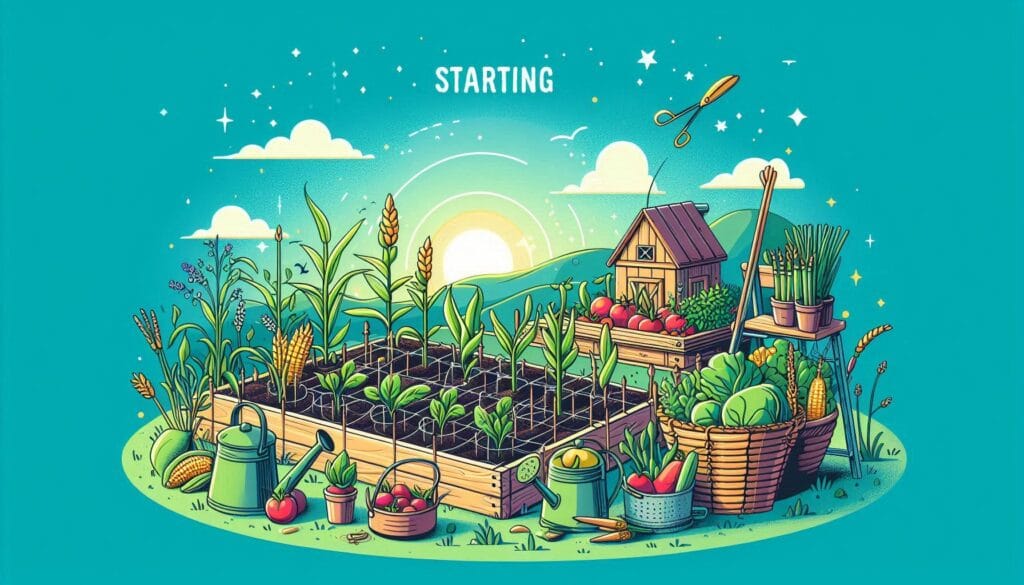Starting your journey into organic farming might feel overwhelming at first, but it doesn’t have to be. With a little creativity and some tried-and-tested techniques, you can grow your own organic produce successfully. Whether you have a small garden, a balcony, or a larger plot of land, these easy tips and hacks will help you get started.

Why Start Organic Farming Us, Beginners?
Organic farming isn’t just about growing food; it’s about creating a healthier environment, producing nutritious crops, and promoting sustainability. Some benefits include:
- Healthier produce is free from synthetic chemicals.
- Environmental conservation by reducing chemical runoff.
- Cost savings by growing your own food at home.
If you’re ready to dive in, here are some beginner-friendly organic farming hacks to set you up for success.
Hack 1: Start with Composting
Why Compost?
Composting is one of the simplest and most effective ways to enrich your soil with nutrients. It reduces waste and provides a steady supply of organic fertilizer, Beginners.
How to Do It
- Collect kitchen scraps like vegetable peels, eggshells, and coffee grounds.
- Layer these with dry leaves, grass clippings, or shredded newspaper.
- Keep the pile moist but not waterlogged.
- Turn the compost every few weeks to speed up decomposition.
In just a few months, you’ll have rich compost to boost your crops Us, Beginners.
Hack 2: Use Companion Planting

What Is Companion Planting?
Companion planting involves growing certain plants together to benefit each other, BeginnersIt helps deter pests, improve soil health, and boost crop yields.
Examples of Companion Plants
- Tomatoes and Basil: Basil repels pests that attack tomatoes.
- Carrots and Onions: Onions deter carrot flies.
- Corn, Beans, and Squash (Three Sisters): These plants support each other’s growth.
Hack 3: Save Seeds for Future Planting
Why Save Seeds?
Saving seeds from your crops reduces costs and ensures you have organic seeds for future planting seasons Us, Beginners.
How to Save Seeds
- Choose the healthiest plants for seed harvesting.
- Allow fruits or vegetables to fully mature before collecting seeds.
- Dry the seeds thoroughly to prevent mold.
- Store seeds in a cool, dry place in labeled envelopes or jars.
Hack 4: Create Natural Pest Deterrents
DIY Pest Control

Avoid synthetic pesticides by using natural alternatives. Here are some ideas:
- Neem Oil Spray: Mix neem oil with water and a little soap to repel pests like aphids.
- Garlic and Chili Spray: Blend garlic, chili peppers, and water, then strain and spray on plants.
- Companion Plants: Grow marigolds to repel nematodes and other pests.
Hack 5: Utilize Mulching
Why Mulch?
Mulching helps retain soil moisture, suppress weeds, and regulate soil temperature.
How to Mulch
- Use organic materials like straw, wood chips, or dried leaves.
- Spread a layer 2-3 inches thick around your plants.
- Keep mulch a few inches away from plant stems to prevent rot.
Hack 6: Build Raised Beds
Benefits of Raised Beds
- Improved drainage.
- Easier access for planting and weeding.
- Better soil control.
How to Build Raised Beds
- Choose a sunny location.
- Use wood, bricks, or recycled materials to construct the borders.
- Fill the bed with a mix of soil, compost, and organic matter.
Hack 7: Use Water Efficiently
Water Conservation Tips
- Install a drip irrigation system to deliver water directly to plant roots.
- Collect rainwater in barrels for irrigation.
- Water plants should be planted early in the morning to reduce evaporation.
Hack 8: Grow in Containers
Why Use Containers?
Containers are perfect for small spaces and allow you to control soil quality and water more easily.
Tips for Container Gardening
- Use pots with drainage holes.
- Fill them with a mix of compost and soil.
- Choose compact crops like herbs, lettuce, or cherry tomatoes.
Hack 9: Rotate Your Crops
Why Rotate Crops?
Rotating crops prevents soil depletion and reduces pest and disease buildup.
How to Rotate Crops
- Divide your growing area into sections.
- Grow different types of crops in each section each season.
- Avoid planting the same crop family in the same spot for consecutive seasons.
Hack 10: Embrace Vertical Gardening
What Is Vertical Gardening?
This method maximizes small spaces by growing plants upward instead of outward.
How to Start
- Use trellises for vining plants like beans or cucumbers.
- Install wall-mounted planters for herbs and flowers.
- Create a pallet garden for strawberries or lettuce.
Conclusion
Organic farming doesn’t require acres of land or fancy equipment. With these simple DIY techniques, you can grow healthy, organic produce in any space. By composting, companion planting, and utilizing small-space strategies, you’ll be well on your way to creating a thriving organic garden.

5 Quick Q&A About Organic Farming Hacks for Beginners
1. How do I start composting if I have limited space?
You can use a small compost bin, bucket, or even a vermicomposting system (with worms) in your kitchen or balcony. These compact methods are efficient and odor-free when managed properly.
2. What are the easiest plants for beginners in organic farming?
Start with herbs like basil, mint, and parsley, or fast-growing crops like lettuce, radishes, and spinach. These are low-maintenance and yield results quickly.
3. How can I control pests without chemicals?
Try natural deterrents like neem oil sprays, garlic-chili mixtures, or companion planting with pest-repelling plants like marigolds. Hand-picking pests or introducing beneficial insects like ladybugs can also help.
4. Can I grow organic produce indoors?
Yes! Use containers with good drainage and position them near windows for sunlight. For low-light areas, consider using grow lights to support plant growth.
5. What’s the most cost-effective way to start organic farming?
Use recycled materials for containers, make your own compost, and save seeds from previous harvests. These hacks minimize initial costs and promote sustainability.



Excuse for that I interfere … I understand this question. Is ready to help.
Excuse, the phrase is removed
Yes, really. I join told all above. We can communicate on this theme.